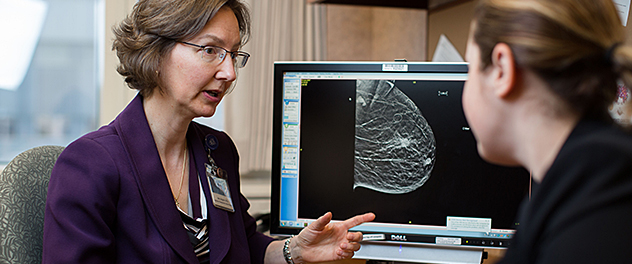 Forging bold paths in the fight against women's cancers
Forging bold paths in the fight against women's cancers
The Women's Cancer Program is committed to tackling the urgent need for improved prevention, diagnosis and treatment for breast cancer, ovarian cancer, endometrial cancer and other women's cancers.
Overview
The Women's Cancer Program is advancing the understanding of breast cancer and gynecologic cancers and improving treatment strategies for these cancers, which will ultimately improve patient survival and outcomes. The program is part of Mayo Clinic Comprehensive Cancer Center.
Research initiatives
Our investigators are reducing the burden and mortality of breast cancer and gynecologic cancers through four main areas of research:
- Identifying key genetic alterations underlying women's cancers. Researchers in this area investigate genes that predispose women to developing breast cancer.
- Defining key mediators and pathways in the biology of women's cancers. Researchers in this area investigate the biological systems that lead to the development of women's cancers.
- Improving identification of women at increased risk. Researchers in this area investigate methods for predicting which women may be at increased risk of breast cancer or gynecologic cancers.
- Developing and testing innovative treatment strategies for women's cancers. Researchers in this area are exploring a range of new clinical strategies for treating breast and gynecologic cancers.
The Women's Cancer Program conducts research at all three Mayo Clinic campuses — in Phoenix/Scottsdale, Arizona; Jacksonville, Florida; and Rochester, Minnesota.
SPORE research grants
The Women's Cancer Program also participates in two Specialized Programs of Research Excellence (SPOREs):
Program leadership
The Women's Cancer Program is directed by Jamie N. Bakkum-Gamez, M.D.; Amy C. Degnim, M.D.; and Matthew P. Goetz, M.D.
- Dr. Bakkum-Gamez is a gynecologic oncologist at Mayo Clinic in Rochester, Minnesota. She also is a professor of obstetrics and gynecology at Mayo Clinic College of Medicine and Science. Her research interests include screening and early detection of ovarian cancer and endometrial cancer. Dr. Bakkum-Gamez also focuses on prevention of ovarian cancer, fallopian tube cancer and primary peritoneal cancer, and is investigating minimally invasive surgical management of gynecologic cancers.
- Dr. Degnim is a surgeon at Mayo Clinic in Rochester, Minnesota. She also is a professor of surgery at Mayo Clinic College of Medicine and Science. Her research focuses mainly on improving the accuracy of breast cancer risk prediction, which also improves breast cancer prevention. Dr. Degnim also leads research efforts related to improving the quality of breast surgery by reducing complications of surgery. She has pioneered clinical research on breast lymphedema and clinical trials on the use of drain antisepsis techniques to reduce surgical site infection.
- Dr. Goetz is a medical oncologist at Mayo Clinic in Rochester, Minnesota. He also is a professor of oncology and of pharmacology at Mayo Clinic College of Medicine and Science, and director of the Mayo Clinic Breast Cancer SPORE. He is a member of the National Cancer Institute Breast Cancer Steering Committee and the Translational Breast Cancer Research Consortium Steering Committee. Dr. Goetz's research focuses on estrogen receptor positive breast cancer, the development of biomarkers, and advancing novel therapeutics for endocrine-resistant breast cancer. His work also includes several comprehensive omics cancer studies designed to prospectively identify biomarkers of response in women with advanced or metastatic breast cancer — the Breast Cancer Genome-Guided Therapy (BEAUTY) and PROMISE studies.